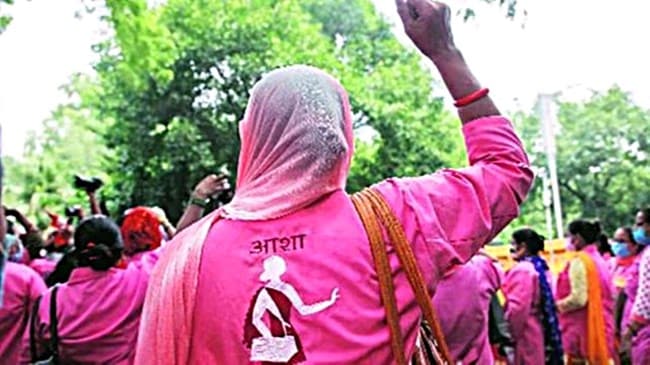Opinion ASHA workers are still not ‘workers’. This is the problem
At a time when political parties are competing to recognise women’s contribution to housework, recognising scheme workers as workers with the right to fair wages, proper working conditions and social security can go a long way in changing the societal approach to women
 The assumption that women are secondary earners and they would be available for voluntary work underlines their visible presence as scheme workers. (File Photo)
The assumption that women are secondary earners and they would be available for voluntary work underlines their visible presence as scheme workers. (File Photo) It has been more than a month since the Accredited Social Health Activists (popularly known as ASHA workers) in Kerala started their long-drawn strike. Though it never got much-needed national attention — either from the media or from the political stakeholders — the issues they raised are of larger relevance both from the perspective of labour rights and women’s rights.
In all of the state-run schemes, care/community workers are always women. “Scheme workers” comprise a diverse set of workers, the largest of them being Anganwadi workers and helpers, who have been there in the system for nearly five decades. Over time, with welfare schemes shifting to mission mode, the number of scheme workers or “volunteers” — most of them belonging to poor and marginalised communities — rose significantly.
The assumption that women are secondary earners and they would be available for voluntary work underlines their visible presence as scheme workers. Notably, the affective labour at the community level, provided by these women, is seen as an extension of care work that they undertake at homes. The labour-intensive work is often trivialised as “soft” and “unskilled” work. The meagre “honorarium” and precarious working conditions are justified based on these assumptions. The gendered notion that the women are quintessential “caregivers” without any technical skills often legitimises such exploitation and undervaluation. Feminisation of these jobs is thus normalised by the system. That the state doesn’t consider them as “workers” leads to them being given “honorarium” instead of wage/salary. Added to this predicament is the glorification of such work in moralistic tones, as commitments to larger social causes.
ASHAs were part of the National Rural Health Mission since 2005, now subsumed under the National Health Mission. As the name ASHA suggests, they are activists and not workers like other scheme workers. They are paid a nominal honorarium besides certain incentives. The honorarium even varies across states. They are part of various community-based health intervention programmes. Depending on their contribution in measurable terms, they get incentives which also vary across programmes. Irregular payment of honorarium and incentives, which was the immediate trigger for the present strike, has been a perennial issue.
Both the state and central government contribute to the payment of ASHA workers, with the centre’s share being critical to run it. Any delay or shortage in funds often leads to part or delayed payments. For example, the honorarium of ASHA workers in Kerala is Rs 7,000, which is one of the highest compared to other states. It is still much below the minimum wage for any unskilled work in the state. The present demand by the striking workers is to increase the honorarium to Rs 21,000 with a one-time payment of Rs 5 lakh, as retirement benefits. By any means, this is the bare minimum that these workers deserve.
However, the authorities have rarely paid heed to the demands of formalising their work. Although the parliamentary standing committee on labour in 2020 had recommended formalising the community workers, there was no follow-up. The only time these workers were acknowledged was during the pandemic, when state governments organised special events to recognise and honour their contributions, apart from paying a small incentive. The heroic contributions of these workers were even acknowledged by WHO, selecting ASHAs for the World Health Leaders Award in 2022. However, none of these accolades have changed or redefined their struggles for dignified work, which reflects the larger state apathy to women who undertake care work.
At a time when political parties are competing to recognise women’s contribution to housework, recognising scheme workers as workers with the right to fair wages, proper working conditions and social security can go a long way in changing the societal approach to women. Recognition of care work within the domain of public employment would surely shake the gendered and unequal division of housework and the disproportionate care burden on women. It is high time for both the central and state governments to address their rightful demands for “worker” status, dignity and decent wages.
The writer is Professor at the Centre for Women’s Development Studies, New Delhi






